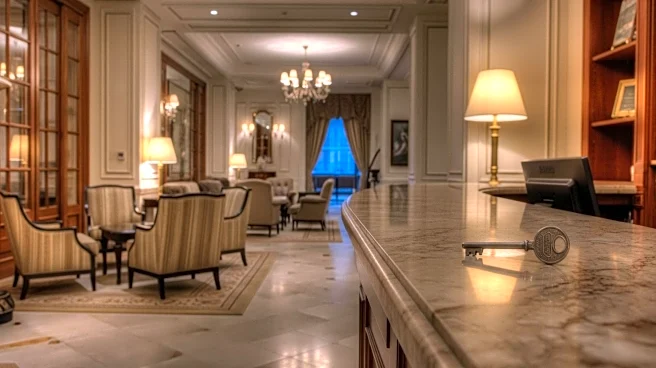What is the story about?
What's Happening?
Willem Dafoe delivers a compelling performance in 'The Souffleur,' a film set in Vienna where he plays Lucius, an American hotel manager. Lucius is confronted with the loss of his job due to a change in ownership of the hotel he has managed for two decades. The film, directed by Gastón Solnicki, is characterized by its poetic and fragmented narrative style, blending past and present through archival footage of the hotel. Lucius navigates his emotional journey as he faces the inevitable changes, interacting with his daughter Lilly and the new owner Facundo Ordoñez. The film premiered at the Venice Film Festival, showcasing Dafoe's ability to bring depth to a character in a non-traditional narrative.
Why It's Important?
The film 'The Souffleur' highlights themes of change and adaptation, relevant to broader societal contexts where individuals face shifts in their professional and personal lives. Willem Dafoe's portrayal of Lucius offers insight into the emotional impact of job displacement, a situation many can relate to in today's dynamic economic environment. The film's artistic approach challenges conventional storytelling, encouraging audiences to reflect on the complexities of human experiences. This narrative style may influence future filmmaking trends, emphasizing character studies over traditional plot-driven stories.
What's Next?
Following its premiere at the Venice Film Festival, 'The Souffleur' may continue to gain attention for its unique narrative style and Dafoe's performance. The film could be showcased at other international festivals, potentially leading to wider distribution. As audiences and critics engage with the film, discussions around its thematic elements and artistic choices may emerge, influencing both public perception and critical analysis. The film's reception could impact Gastón Solnicki's future projects, encouraging exploration of similar narrative techniques.
Beyond the Headlines
The film's exploration of change and adaptation resonates with broader cultural and ethical considerations, particularly in the context of job displacement and personal identity. Lucius's journey reflects the emotional and psychological challenges faced by individuals in transitional periods, prompting viewers to consider their own responses to change. The film's artistic style, blending past and present, raises questions about memory and legacy, inviting audiences to reflect on how history shapes current experiences.















